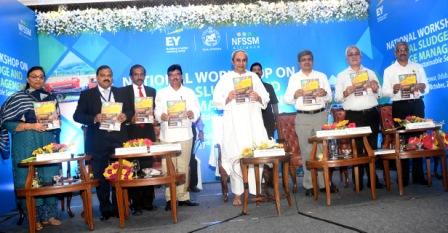Bhubaneswar: Chief Minister Naveen Patnaik Friday stressed on ‘Swachh Odisha Sustha Odisha’ while dedicating six Septage Treatment Plants (SeTPs) to the people of the state.
The facilities inaugurated are at Bhubaneswar, Puri, Dhenkanal, Berhampur, Sambalpur and Rourkela.
The Chief Minister dedicated the plants through videoconferencing for the other five cities while attending the two-day national workshop on ‘Faecal Sludge and Sewage Management (FSSM)’ being organised here in the city.
“The government’s prime focus is open defecation free cities. With the large number of toilets being constructed, safe treatment and disposal of human waste has become a matter of grave concern,” Patnaik said.
He said the inauguration of the SeTP is a significant step towards ‘Swachh Odisha Sustha Odisha’ campaign and that Odisha is doing very well in this regard.
Housing and Urban Development (H&UD) Minister Niranjan Pujari spoke about the new projects launched by his department.
Chief Secretary Aditya Prasad Padhi called upon officials involved in septage management to be diligent while executing the development projects and make urban areas more livable.
Lauding the initiatives of the Odisha Government, Union Housing and Urban Affairs Secretary Durga Shankar Mishra said that Odisha has led the way in sustainable sanitation.
The six SeTPs inaugurated Friday will now treat faecal sludge and septage before disposal. It will considerably reduce the water pollution caused by municipal liquid waste, and is also expected to significantly reduce pollution in the major rivers flowing by these cities, a release said.
The Housing and Urban Development department and the Odisha Water Supply and Sewerage Board (OWSSB) took the initiative for the construction of nine SeTPs at Bhubaneswar, Cuttack, Puri, Berhampur, Balasore, Bhadrak, Baripada, Sambalpur and Rourkela under the AMRUT scheme.
The facilities at Angul and Dhenkanal were constructed under ‘Project Nirmal,’ and now around 60 per cent of the state’s urban population will be covered, the release added.
Apart from this, the state has also procured 86 cesspool vehicles for safe transport and disposal of faecal sludge in urban areas.
For cities with no sewage treatment facilities, safe temporary disposal methods like deep row entrenchment (DRE), is being undertaken by urban local bodies (ULBs).
The ULBs are also going to adopt Faecal Sludge and Septage Management Regulations, 2018, to regulate matters regarding septage management in urban areas, the release added.
